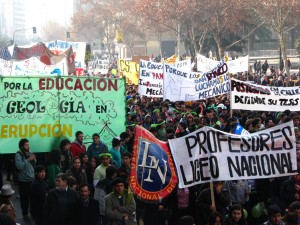Educational Crisis in Chile
Chile had an emotional winter in 2015 (summer in the United States). Not only did the nation host and win the Copa América soccer tournament, but it also underwent significant policy reform. Most notably, the recent educational reform stirred several student protests.

Chilean students and professors took to the streets this winter to demand education reform. A June to July strike by university professors that resulted in academic calendar delays coincided with several student marches held on June 10, June 17, and August 27 that reached as many as 200,000 participants. The Confederation of Chilean Students (Confech) led most of these marches, which
mirrored similar movements in recent years, such as the 2011 marches for free university education.
Current president Michelle Bachelet included education reform as part of her 2014 campaign platform, but her reforms are currently facing criticism. One large pillar of Bachelet's education reform changed the teaching profession salary system by encouraging professors to be individually evaluated by performance and then receive a 28% pay raise. The local Professor's Union was outraged and responded with a fifty-seven day strike. The second pillar was accessible education with reforms to payment systems of Chilean universities, and President Bachelet promised free university education by 2020. Recently her government announced that as of 2016, 60 percent of the poorest students would be able to attend university free of charge.
However, Chile's education system faces a structural problem. Since the dictatorship of Augusto Pinochet saw the privatization of the university system in Chile, one recurring complaint is that universities in Chile operate primarily as businesses rather than institutions of higher education. In 2012, Chilean universities had an annual average enrollment fee of $3,045 (in 2015 dollars), but roughly 70% of Chilean workers earn $617 or less per month. Poorer students who might not be able to pay the full tuition costs are provided with scholarships from the Chilean government in the form of credits, but these rarely cover full costs and are not widely available.
Despite the government’s attempts at reform, Chileans continue to protest for further changes. Nonetheless as Chileans head towards summer, it is unlikely that the issues of educational reform will resolve themselves before the end of the academic or calendar year.
